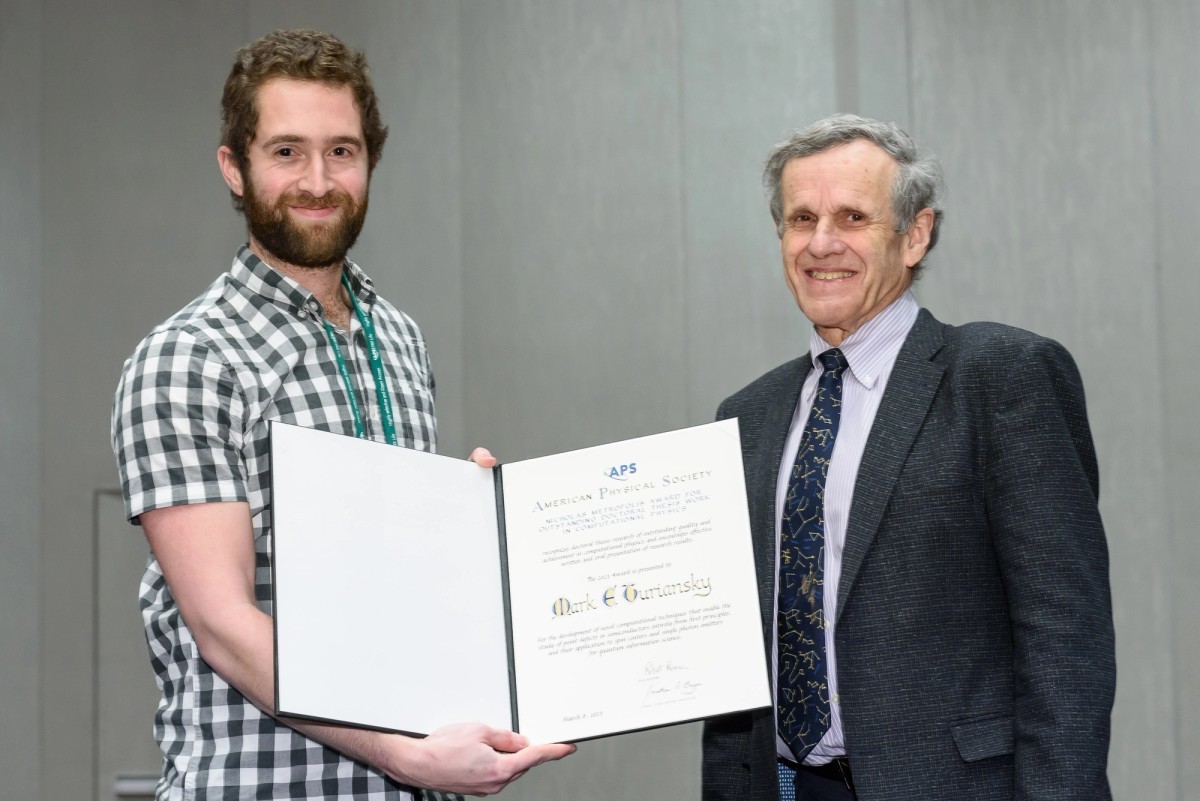Nicholas Metropolis Award for Outstanding Doctoral Thesis Work in Computational Physics

The Division of Computational Physics is pleased to announce its annual competition for the Nicholas Metropolis Award for Outstanding Doctoral Thesis Work in Computational Physics. This award recognizes doctoral thesis research of outstanding quality and achievement in computational physics and encourages effective written and oral presentation of research results. The annual award consists of $2,500, a certificate, travel reimbursement up to $1,500, and a registration waiver to receive the award and give an invited talk at the APS March Meeting.
Rules and eligibility
Nominations will be accepted for any doctoral student (present or past) in any country for work performed as part of the requirements for a doctoral degree. Nominees must have passed their thesis defense not more than 18 months before the nomination deadline. An individual can be nominated only once; however, nominations will be considered for two review cycles provided the nominator re-certifies the nomination before the next deadline.
Process and selection
The nomination package should include:
- APS Prizes and Awards Nomination Form (available via the online application interface, APS Honors Nominations)
- Recommendation letter from nominator (generally the thesis advisor). This letter should also certify the eligibility of the student and delineate in detail the contributions of the nominee, making comparisons with others.
- The thesis manuscript in PDF format
- A thesis summary accessible to a computational scientist without specific expertise in the field of the thesis, prepared by the nominee.
- Two additional letters of support, at least one from outside the nominee’s institution
- Nominee’s CV
- Demographics form (if known/wish to specify age, gender, race, and ethnicity of the nominee)
Establishment and support
The award is supported by the Division of Computational Physics.
Recent recipients
Gabriele Bozzola
2024 recipient
For developing numerous open-source computational tools to conduct dynamical general relativistic simulations both with and without magnetized matter, and for spearheading simulations of binary black holes with U(1) charge, thereby establishing the first-ever constraints on the charge of black holes using LIGO/Virgo detections.
Mark E. Turiansky
2023 recipient
For the development of novel computational techniques that enable the study of point defects in semiconductors entirely from first principles, and their application to spin centers and single photon emitters for quantum information science.
Alina Kononov
2022 recipient
For trailblazing contributions to the computational modeling of materials physics, including large-scale simulations of irradiated materials and advances in time-dependent density functional theory.
Zhenglu Li
2021 recipient
For the development and highly-scalable implementation of novel first-principles GW perturbation theory methods to compute electron-phonon coupling with many-electron correlation effects included, and its applications to phonon-induced phenomena in oxide superconductors.
Giacomo Torlai
2020 recipient
For pioneering achievements in adopting machine learning technology, especially restricted Boltzmann Machines, into the field of condensed matter and quantum information physics.
The membership of APS is diverse and global, and the nominees and recipients of APS Honors should reflect that diversity so that all are recognized for their impact on our community. Nominations of members belonging to groups traditionally underrepresented in physics, such as women, LGBT+ scientists, scientists who are Black, Indigenous, and people of color (BIPOC), disabled scientists, scientists from institutions with limited resources, and scientists from outside the United States, are especially encouraged.
Nominees for and holders of APS Honors (prizes, awards, and fellowship) and official leadership positions are expected to meet standards of professional conduct and integrity as described in the APS Ethics Guidelines. Violations of these standards may disqualify people from consideration or lead to revocation of honors or removal from office.